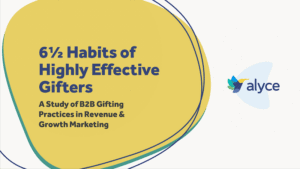
Let me tell you a story about the time my father received the worst piece of direct mail, ever.
It happened just after he lost his parents. And if you’ve never lost anyone close or had to make arrangements after death, let me tell you, it’s complicated with lots of paperwork that needs to be completed in a timely manner.
Since most people aren’t experts in this area, there are companies that help grieving family members manage it all. The whole process consumes lots of time and energy during a period when you’d rather be doing anything else.
The company my father chose to help him with the process wanted to send him a gift, as a thank you and condolence, once everything had been completed. My dad told them he didn’t want anything, he just wanted to wrap everything up as quickly as possible.
But, they disregarded his feelings and sent him their standard piece of direct mail anyway.
Yup, this company sends the same gift to every client they work with no matter what. It’s a bulk item. How do you think that made my father feel? To be sent something so impersonal at such a time. If it’s the thought that counts what’s a gift that has no thought put into it?
If it wasn’t enough to be trite and unattractive what the gift lacked most was empathy.
Unfortunately, this type of behavior is becoming the norm with direct mail. Companies send out gifts that serve the purpose of the campaigns they’re running, that serve their needs but are unrelated to the recipient’s lives.
Which is disrespectful. The person receiving your gift is what matters when you’re putting together any campaign, especially one like this.
I’m not saying that every direct mail campaign fails as hard as the one my dad experienced, but this gifting guide is going to explore how you can craft an empathetic campaign to avoid this pitfall.
Some Background on Direct Mail
As marketing strategies have become more complex and budgets have continued to grow, direct mail has grown into a $44 billion industry and, according to a 2019 study done by MSP, it is now the second largest channel for ad spend in the U.S, growing 4%-6% year over year.
Marketing and sales teams use direct mail to break through the noise of digital advertising and get in front of their prospects in a creative way, attempting to build brand awareness or increase B2B customer retention.
Where B2C (business to consumer) companies focus more on mailers, B2B (business to business) companies tend to send larger pieces of mail like physical goods, baked goods, and e-gifts.
The goal of the mail is the same though – to stay top of mind for the person on the receiving end and funnel the prospects and customers to the next stage in their journey – and fill your pipeline.
Related: Outbound Marketing Strategies & Techniques (7 Best Examples)
But as the world changes, marketing and sales strategies need to change with it.
People are tuning out direct mail and throwing it in the trash. Gifts that are only self serving to the company sending them isn’t driving the action on the receiving end that the company expected, and it’s nearly impossible to track the ROI of each of these campaigns.
The way that companies are executing direct mail is itching for a change.
It’s not the channel of direct mail that needs to change, but the approach you take when you execute these campaigns.
With business making the fundamental shift to adopting more of a remote and digital workforce, relying on a direct mail system that forces companies to ship their gifts to offices, rather than people, creates the opposite effect of what you’re trying to accomplish with direct mail – to make a positive impression on your prospects.
Sending a gift to the wrong address just surfaces another problem with Direct Mail: it’s not personal.
You’ve misunderstood a fundamental part of who the person is that you’re trying to capture attention from – they don’t sit in the company headquarters.
This shows right off the bat, that you haven’t done your research.
Sure, not every direct mail turns into a direct fail, like sending something to the wrong address, but most mail is not personal.
It can be personalized by placing a different name on every box, but, being personal, like on a 1:1 basis is hard to execute at scale.
So what makes a piece of direct mail personal? The gift is relatable, relevant, and respectful. It taps into who the recipient is a person and it’s not totally self serving
Need some help crafting the perfect email? Check out our gifting email templates!
Here’s how you can create a personal gifting strategy that takes into account those 3 Rs:
Your Gift Should Be Relatable
The Alyce Definition of Relatable
Your gift is relatable when you create a personal bond with the recipient by appealing to their #5to9™, in other words, what they do and who they are when they’re not at the office.
Most gifting campaigns revolve around a campaign – there’s something you want the gift recipients to do or know once they open their gift.
However, most of these campaigns involve sending the same gift, with the same message, to each of the prospects or customers on your list.
If you’re sending the same gift to different people without the possibility of exchanging that gift for something else, there is no way that each recipient will be able to relate to it.
It’s impossible to assume that the gift you’ve chosen to send is exactly what everyone on your list would want at that very moment.
It’d be a little creepy even if you could know that.
And sure, it might grab their attention for a moment, but then it goes back to being an item that the person didn’t want and never asked for.
When we talk about relatable gifts, we mean gifts that take into account current events, and who the recipient of the gift is – not the persona that they fit into but the person that they are outside of their 9-5 job.
Generally, you can find this out by doing your homework and researching your prospects. But doing your research on hundreds of prospects is pretty time consuming. That’s why we use AI to learn more about our gift recipients, so we can create 1:1 relationships with them at scale.
The research helps you understand who your gift recipients are in their 5-9, in other words who they are after work hours. By tapping into that part of a person you can form real relationships based on common interests.
And you can avoid sending cupcakes to a keto enthusiast or gluten-full cookies to someone with celiac.
Examples of Unrelatable Gifts:
You are running an ABM campaign and have a list of best-fit contacts you want to reach out to. The list has over 100 names on it and you want these accounts to sign up for a webinar that happens to co-inside with opening day for Baseball.
So you send everyone on your list a calendar of game times for the local sports team in their area for opening day.
But half the recipients don’t follow or care about sports. That gift is either going in the trash or someone else’s hands. That’s what we call a #DirectFail.
Examples of Relatable Gifts:
You’ve done your research on your prospect and you’ve found that they play on a co-ed soccer team in their spare time.
As your gift to them, you send some new shin guards and reference their hobby in your email personal note to them.
That person is thankful you did your research and is open to having a conversation with you.
Your Gift Should Be Respectful
The Alyce Definition of Respectful
Your gift is respectful when you’re communicating with your recipient in the way that you would want to be communicated to.
When you’re sending a gift, there is a mindset shift that’s hard to execute but makes all the difference: Give first.
Be respectful of the relationship you’re trying to create with the recipient. It’s not going to be built on trust if you come across pushy or disrespectful of the receivers time and priorities.
If you think about it, you actually have a better chance of booking a meeting after a gift has been accepted because you have some way to relate to the person on the other end. B2B sales is a dance, and gifting is a great first step toward creating the relationship. Reaching back out to schedule a meeting is a natural next move.
Related: B2B Gifting Best Practices to Make a Positive Impact
If you’re using a gifting platform that provides the recipients with the power to choose what gift they claim, you now have a more personal talking point you can hit on that’ll stand out from small talk about the weather or current events.
Sure, it’ll add another step to the meeting booking process, but creating trust will increase meeting show rates and speed up close rates in the long run.
It’s also important to understand that during times of uncertainty, answering sales or marketing emails isn’t always someone’s first priority.
Being respectful and allowing your recipients to enjoy your gift on their own time is what it’s all about.
Example of Disrespectful Gifting
You send a piece of mail to your prospect and have gotten the tracking from the shipping company that the gift has been delivered.
You email, call, and LinkedIn message your prospect asking if they have received your gift and pushing them to get on a call with you.
You do not tailor your messages to each prospect and mass-send the same message across all gift recipients.
Example of Respectful Giving
You’ve sent a gift to your prospect and notice that they’ve viewed the gift but haven’t claimed it, if you’re using Alyce, or you noticed the gift has been delivered but you haven’t heard from them.
You send them a video coming from you, specifically for them, asking for feedback on the gift to understand if it was the right gift, or if the timing just isn’t right.
Your Gift Should Be Relevant
The Alyce Definition of Relevant
You are being relevant in your marketing when you recognize the current business circumstances of your prospect’s 9-5.
It’s no secret that 2020 brought some unprecedented times for everyone, everywhere.
The wrong thing to do when executing a gifting strategy during that time is to ignore the situation all together OR use the situation to fear monger your prospects into buying your product or service.
In times of uncertainty, customers and people in general will turn to brands they know and can trust.
People, not “buyers” but real people, are more skeptical during this time and if you try and carry on with business as usual or try to scare people into using your product or service, you’ll strike out immediately. You only get one chance to destroy your reputation.
I don’t mean to be dramatic, but this is why empathy and the 3 R’s are so important with your consumers, especially when times are tough.
In order to drive action and positive attention from your gifting, taking the time to incorporate these 3 R’s into your marketing and selling plan will help you build rapport, earn trust, and create loyalty for you and your brand.
Example of Irrelevant Gifting
You send a generic message and generic gift to all prospects on your list and only use personalization tokens as your form of “personal” outreach.
You don’t prioritize researching the company and assume that the product you’re selling is necessary no matter what the circumstances.
Example of Relevant Gifting
You’ve done your research on the company and know where their priorities are, but also identify an area of opportunity for their team to tap into to help them be more successful.
You reference your research in your outreach, where you use the gift that you’ve sent as a catalyst for grabbing their attention and starting the conversation.
I don’t mean to be dramatic, but this is why empathy and the 3 R’s are so important with your consumers, especially when times are tough.
In order to drive action and positive attention from your gifting, taking the time to incorporate these 3 R’s into your marketing and selling plan will help you build trust, build relationships, and create affinity for your brand during times of uncertainty and beyond.
Also, in case you were wondering, this is the gift my dad got:
Want to learn how we digitized our own gifting programs while maintaining a personal experience for each gift recipient? Check out this blog!








